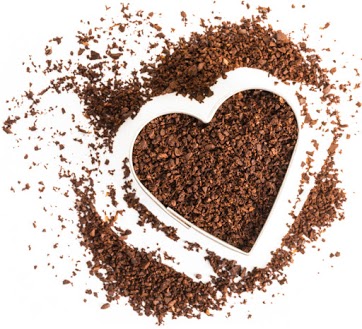When asked, most people recognize that coffee has lots of health benefits. If you didn’t know that, well, now is your time to celebrate.
Some people wonder whether this is because coffee has protein in it (especially since we did a blog about a caffeinated protein shake recipe).
It may surprise people, but coffee actually does contain protein. It’s just such a small amount, that it’s pretty much negligible (and is likely why some plain coffee is listed at 5 calories, while others are at 0 calories).
According to Livestrong.com, an average cup of coffee contains .28 grams of protein.
For a reference point, Harvard recommends .8 grams of protein for every kilogram that a person weighs. This is approximately 1 gram of protein for almost every 3 pounds you weigh.
So, although coffee contains protein, it is not a significant source of it.
Coffee does contain trace amounts of an assortment of amino acids, however. Amino acids are the building blocks for protein, and your whole body really. There are 22 amino acids total, and coffee contains 3 of them: glutamic acid, glycine and aspartic acid.
Glutamic acid is key in helping with neurotransmitters in your brain. When you see L-glutamine or glutamine supplements, this is what it is. It is not an essential amino acid, meaning the body can usually make it on its own when necessary and supplementation outside of regular food and drink consumption is rarely advised (so, keep drinking your coffee, and don’t worry about it in your protein powders).
Glycine helps with collagen and being a base for many natural products in the body. It is also can help with everything from strokes, to cancer prevention, to memory enhancement.
Aspartic acid helps in a whole host of thing, but is very important in the urea cycle.
There are 22 total amino acids the human body deals with, and 9 of these are considered essential for humans. This is because the human body cannot make those 9 essential amino acids on its own, and therefore needs to consume them for the body to function properly. Coffee contains at least small amounts of 7 of those 9 essential amino acids, and 16 of the 22 total amino acids.
Although the 3 main amino acids listed above are contained in coffee, there are small amounts of threonine, isoleucine, leucine, lysine, cysteine, phenylalanine, tyrosine, valine, arginine, histidine, alanine, proline and serine.
Threonine is an essential amino acid that when taken as a supplement can help with nervous system disorders like ALS, multiple sclerosis, and unwanted or constant muscle contractions in general.
Isoleucine is another essential amino acid that many bodybuilders use as a supplement. It helps with both energy and recovery after a workout.
Leucine, also an essential amino acid, and is the most prevalent amino acid in the muscles.
Lysine, essential as well, does everything from helping promote calcium absorption to producing enzymes and hormones that the body needs.
Cysteine can transform into a powerful antioxidant in the body. It is pretty well established, even in popular culture, that coffee is loaded with antioxidants. Antioxidants help destroy free radicals, which are damaging to the body’s cells.
Phenylalanine is not very well understood scientifically, although it is currently sometimes used to ease depression, chronic pain, Parkinson’s, arthritis, and a host of other afflictions.
Tyrosine is key to helping the body produce necessary neurotransmitters, more specifically with epinephrine, norepinephrine, and dopamine.
Valine is 1 of 3 branch-chain amino acids (with isoleucine and leucine) that make up about 70% of all amino acids in the body. This means that it is important. Valine is a stimulant, helping to produce glucose when necessary, and is also key for muscle metabolism, tissue repair, and more.
Arginine is key in helping develop nitric oxide, which is important for blood flow. Arginine also helps the kidneys remove waste, the body heal wounds, and helps with immune system and hormone function.
Histidine is the chemical precusor to histamines, and histamines are what help regulate allergic reactions in your body. Histidines also have antifungal properties, and are also key in developing hemoglobin in the blood.
Alanine helps produce energy, and is an effective aid for the liver when it is trying to remove toxins from the body.
Proline helps break down proteins into their various amino acid forms, but also helps with blood pressure regulation and the prevention of arteriosclerosis (hardening of blood vessels).
And, last but not least, serine. Serine can be toxic if taken in too large quantities, but it is very helpful for the myelin sheath that protects and helps nerves, and is found in the membranes of every cell, and is involved in the making of the 4 bases for DNA (adenine, guanine, cytosine, thymine; ie A-G-C-T).
So, now when you see us posting on Facebook some new scientific study showing all of the health benefits that come along from drinking coffee, you have a basis for understanding just why. With such a large amount of amino acids, it’s really no wonder why coffee is part of a healthy lifestyle.
Yes, just like many things in life, it does need to be done in moderation. So, make sure your coffee consumption stays on point.
Did you appreciate this article from Match Made Coffee? Let us know what you think, or if you have any follow up questions.






